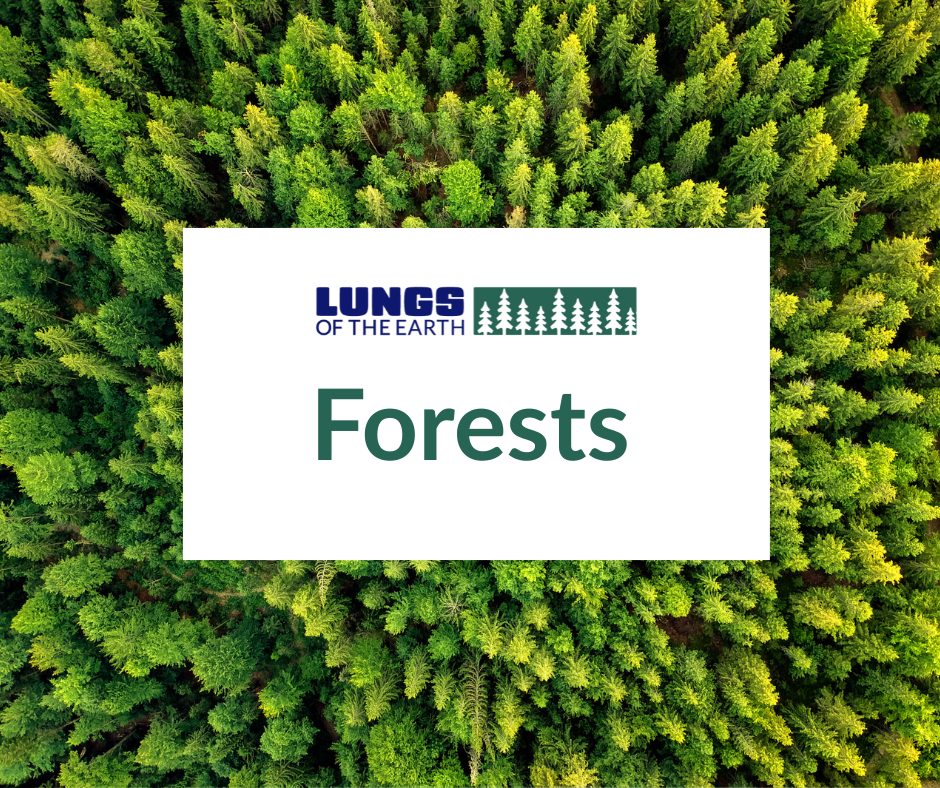
'Lungs of the Earth' is a call for environmental action and advocacy. It invites Anglicans to restore and protect God's world with a particular focus on three vital ecosystems that act as the planet's natural lungs of the earth: oceans, forests and ice caps.
Due to environmental damage, the lungs of the earth are at risk, with huge implications for people and planet.
'Lungs of the Earth' also ties in with Anglican advocacy in the lead up to COP30, which will meet in Brazil in November 2025. The advocacy focus on oceans, forests and ice caps has been developed with Anglican environmental advocates around the world, particularly indigenous Anglicans. It will reflect the wisdom, traditions and sustainable practices of indigenous communities, in caring for the planet.
The initiative aims to:
When the lungs of the earth are damaged, all creation struggles to breathe, and the poorest and most vulnerable communities bear the heaviest burdens.
This is more than an environmental emergency. It is a spiritual crisis and a matter of justice. When forests are razed, coral reefs bleach, and ice sheets melt, we are not only witnessing ecological loss — we are failing in our calling as stewards of God’s creation.
The Church is called to participate with Jesus in the restoration of all things (Colossians 1:20). Rooted in the Anglican Communion's Fifth Mark of Mission, 'Lungs of the Earth' invites Anglicans everywhere to take action—to 'treasure the earth' and safeguard it for future generations.
Action and Advocacy: Ways to get involved
The work of protecting the lungs of the earth begins in every parish, diocese, and community.
Across the globe, Anglican churches are making a difference through local environmental projects and by actively advocating with governments and corporations on climate and environmental issues.
From community gardens to renewable energy initiatives, from habitat restoration to climate policy advocacy, our communion is responding to the urgent call of creation care.
Wherever you are in the Anglican Communion, you can be part of this movement for creation care and climate justice.

Oceans clean the atmosphere and act as a huge carbon sink, absorbing 90% of the excess heat caused by climate change.
Risk: Each year, over 100,000 marine mammals and 1 million seabirds are estimated to die from plastic pollution alone. Coral reefs are dying from warming seas and pollution, with devastating consequences for marine life and coastal communities.
Response: The Anglican Church of Aotearoa New Zealand and Polynesia consistently calls for urgent ocean restoration. It advocates for a fossil-fuel-free Pacific, protection of at least 30% of the ocean, and a global ban on deep-sea mining.
Action: Reduce plastic waste polluting the oceans. Organise a cleanup of your local area with your church and note how much single-use plastic you collect.
Advocacy: Visit your nearest (super) market and government representative to ask what they are doing to reduce single-use plastic production.

They play a crucial role in absorbing carbon dioxide and producing oxygen, which is essential for life.
Risk: Mass deforestation continues to cause harm. In the Amazon, 68.9 million hectares of forest cover has been lost between 2001 and 2023. This threatens biodiversity, displaces indigenous peoples, and accelerates climate change.
Response: Projects run by the Anglican Church in Kenya are protecting and restoring parts of the Karura urban forest in Nairobi. The church has adopted 3,000 hectares and aims to plant 15 million trees in the coming years.
Action: Get involved in the Communion Forest, a global environmental and ecological restoration initiative encouraging churches to protect, restore, and grow forests and other habitats.
Advocacy: Find out about your country's laws to protect forests from excess damage (including from logging, business activity and mining). Ask your nearest government representative how these laws are being implemented locally.

Glaciers and Ice caps operate as lungs of the earth because they play a vital role in regulating the planet's temperature and climate by reflecting solar radiation back into space. They also store vast amounts of freshwater, which is crucial for maintaining ecosystems and supporting human populations.
Risk: Melting ice caps, are causing sea levels to rise and impacting ecosystems worldwide. The accelerated melting of glaciers and ice sheets is leading to significant changes in global weather patterns.
Response: Churches are increasingly involved in environmental preservation efforts, particularly in the Arctic, focusing on sustainability, climate action, and community engagement. Here a majority of Anglicans are indigenous and caring for creation in ways passed on for centuries.
The Church of England's net zero campaign aims to achieve net zero carbon emissions across the church by 2030, with a focus on reducing energy consumption in its buildings, schools, and work-related transport.
Action: Reducing emissions reduces global warming. Find out if your church is using renewable energy (Eco Church project), make journeys on public transport that use renewable energy, or find ways to reduce collective energy in your workplace (for cooking, lighting, heating, data storage and travel).
Advocacy: How countries phase out emissions is a justice issue. Each country commits to a different plan called a ‘Nationally Determined Contribution’, which will be reviewed at COP30. Find out how ambitious your country is being on the Climate Action Tracker.
In November 2025, Anglicans from across the Communion will join with other faith groups, leaders, scientists, campaigners, and indigenous representatives in Belém, Brazil for the 30th United Nations Climate Change Conference (COP30)
Belém sits at the gateway to the Amazon rainforest — one of the planet’s greatest life-support systems. Hosting COP30 here will shine a spotlight on the forests, oceans, and frozen regions that help the earth breathe — and on the urgent need to protect them.
The Anglican delegation will arrive at COP30 with a clear and urgent message: the world must protect and restore the lungs of the earth. They will urge governments to:
Want to get involved in the Lungs of the Earth initiative? Download the Lungs of the Earth resource pack and some social media graphics. You can follow daily content on the Anglican Communion Office channels listed below.
Access news and information about Lungs of the Earth on the Anglican Communion Office social media channels.
Hashtag #Anglicans #LungsOfTheEarth
Facebook: @TheAnglicanCommunion
Instagram: @AnglicanCommunion
X: @AnglicanWorld